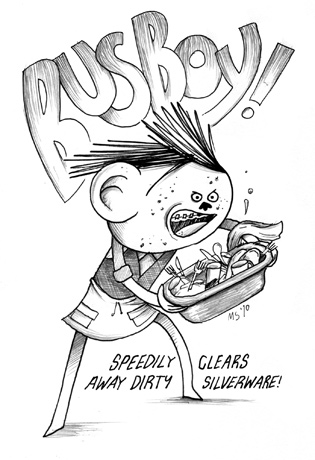The motor vehicle for carrying passengers is spelled bus; its plural is eitherbuses or busses, both Standard. The verb bus, meaning “to transport by bus,” developed quite regularly through functional shift. It met some opposition at first, primarily because it was new, but the movement toward racial equality in education in the sixties brought it into widespread use, and it is now Standard:The board decided to bus the children to the suburban schools. Its participles are both spelled either way: bused, bussed; busing, bussing. The other noun, meaning “kiss,” is always spelled buss, and the plural and the third person singular of that verb are spelled busses. This word, both noun and verb, is Standard but perhaps now either arch or old-fashioned.
A bus boy or busboy assists the waiter or waitress in a restaurant; he clears dishes (he buses or busses them), and all of his duties come under the heading of busing or bussing. The origin of this Americanism is uncertain. It is almost certainly from a clipping of omnibus, but whether because busing involves pushing a cart (a bus) full of dirty dishes or clearing everything (food, dishes, silver, glassware, and crumbs—a regular omnibus of items) from the table is unknown. There is no bus girl, but some speakers are beginning to use bus person.


 字體:小 中 大
字體:小 中 大







